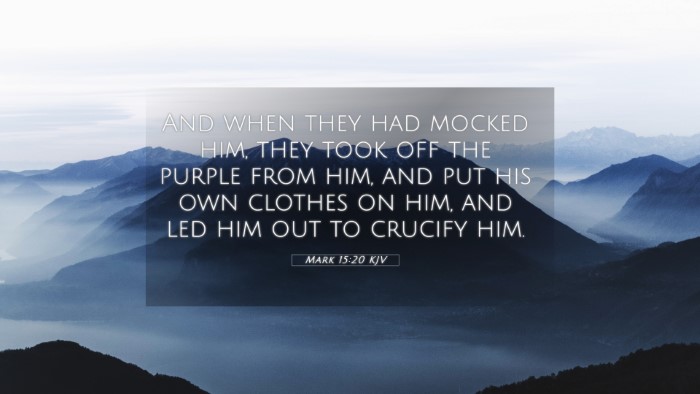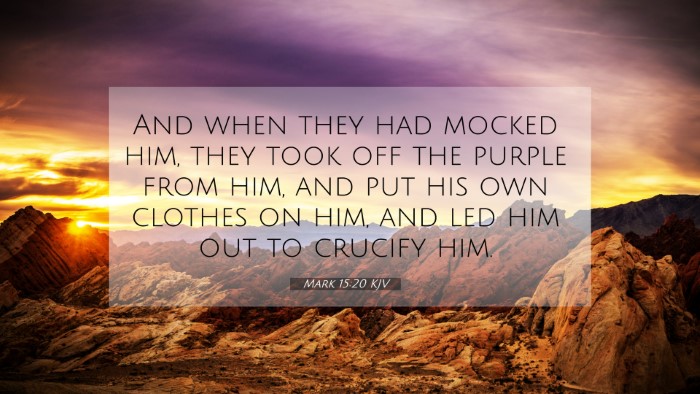Understanding Mark 15:20
Mark 15:20 states, "And when they had mocked him, they took off the purple from him, and put his own clothes on him, and led him out to crucify him." This verse occurs during the scenes of Jesus’ trial and his subsequent humiliation before his crucifixion. Here, we will explore its meaning and significance by combining insights from various public domain commentaries.
Contextual Analysis
In the context of Mark 15, Jesus is subjected to mockery and disdain by Roman soldiers and others. The stripping of his purple robe symbolizes the superficial glory that the world assigned to him, reflecting the greater truth of his true kingship and the suffering he was about to endure.
Commentary Insights
-
Matthew Henry's Commentary:
Henry emphasizes the cruelty in this mockery and the fulfillment of prophecies. He notes how the soldiers took the purple robe, which they adorned him with in mockery and replaced it with his own clothes, symbolizing a return to his earthly state after their derision of his divine kingship.
-
Albert Barnes' Notes:
Barnes highlights the significance of the purple robe, representing royal dignity. The act of putting on his own clothes is a sign of the transition from mockery to the grim reality of his upcoming crucifixion. It indicates the deep irony of how they treated the King of Glory.
-
Adam Clarke's Commentary:
Clarke reflects on the brutality exhibited by the soldiers. He interprets the mockery as part of the prophecy of the suffering servant in Isaiah, showing that Jesus’ suffering was not only physical but also social and emotional, as he faced humiliation at the hands of his own creation.
Thematic Connections
This verse can be thematically connected to several scripture passages that emphasize Jesus' humiliation and suffering, as well as the deep irony of his kingship that leads to the salvation of humanity. Below are some key cross-references:
- Isaiah 53:3: "He is despised and rejected of men; a man of sorrows, and acquainted with grief." This verse foreshadows the disdain Jesus would face.
- Philippians 2:7-8: "But made himself of no reputation, and took upon him the form of a servant." This provides an understanding of Christ’s humility and obedience, culminating in the crucifixion.
- Matthew 27:29: "And when they had platted a crown of thorns, they put it upon his head." This verse parallels the mockery of Jesus’ royalty.
- Luke 23:11: "And Herod with his men of war set him at naught, and mocked him..." This shows the continuity of mockery faced by Jesus among various leaders.
- John 19:2: "And the soldiers plaited a crown of thorns, and put it on his head..." This further illustrates the physical and emotional abuses he suffered.
- Isaiah 50:6: "I gave my back to the smiters, and my cheeks to them that plucked off the hair." This prophecy elaborates on the physical abuse Jesus endured.
- Hebrews 12:2: "Looking unto Jesus the author and finisher of our faith; who for the joy that was set before him endured the cross..." This emphasizes the purpose behind His suffering.
Applications and Implications
Understanding Mark 15:20 involves a grieving appreciation of the suffering of Christ. As believers, we draw important lessons about the nature of true kingship, which is often intertwined with sacrifice, humility, and love. This verse jars us into reflecting on the depth of Christ’s love for humanity and his willingness to endure shame for our salvation.
Conclusion
Mark 15:20 serves as a crucial point in the Passion narrative, establishing connections between the mockery Jesus faced and the prophetic words of the Old Testament. By cross-referencing related verses and contemplating the deeper implications of Jesus's suffering, we gain richer insights into his mission and identity. This process not only enhances our understanding of scripture but also invites us into a deeper relationship with the themes of sacrifice and redemption permeating the Bible.




